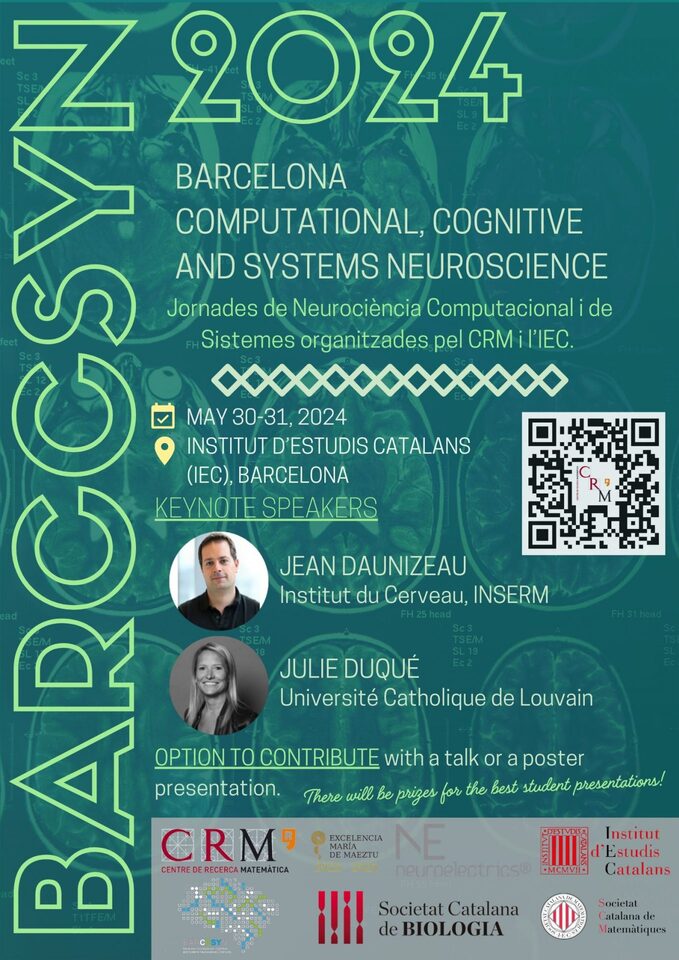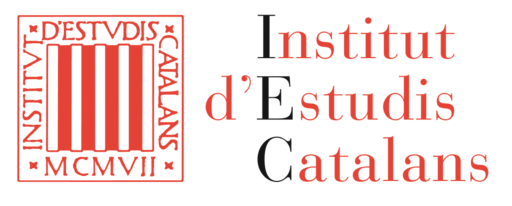BARCCSYN 2024
Sign into May 31, 2024
REGISTRATION FEE
130€*
Reduced for SCB or SCM members 100€
*It covers coffee breaks, lunch, and a reception.
Sala Prat de la Riba, Institut d’Estudis Catalans (IEC)
Carrer del Carme, 47, 08001 Barcelona
Institut d'Estudis Catalans
SCHEDULE
POSTER SESSION & BLITZ 1
POSTER SESSION & BLITZ 2
PHOTO GALLERY
information

BARCCSYN PAST EDITIONS
organizers
Keynote speakers
Does efficient value synthesis in the OFC explain how risk attitude adapts to the range of risk prospects?
Jean Daunizeau
Institut du Cerveau, INSERM
ABSTRACT
Is irrational behavior the incidental outcome of biological constraints imposed on neural information processing? Recent studies indicate that orbitofrontal neurons encode decision value in relative terms, i.e. value signals in OFC neurons are normalized with respect to the context. Value-based decisions may thus exhibit irrational context-dependence effects. A candidate explanation is “efficient coding”: OFC neurons may minimize information loss by adapting their (bounded) output firing properties to the recent value range. This is seducing, because it suggests that relative value coding is the brain’s best attempt to mitigate its own hard-wired biological constraints. However, whether the behavioral implications of this scenario are met, how it generalizes to realistic situations in which OFC neurons construct value from multiple decision-relevant attributes – which we coin “value synthesis” – and what its neurophysiological bases are, is unclear. Here, we approach these issues from a neurocomputational perspective. First, we show how artificial neural networks can self-organize through neo-hebbian rewiring processes to operate efficient value synthesis, i.e. value synthesis that is robust to neural perturbations. Importantly, we show that such mechanism predicts that value synthesis progressively adapts to the experienced range of decision attributes. In turn, the relative weight of decision-relevant attributes onto value-based decisions is inversely proportional to their respective range. We then test these predictions on two open fMRI datasets from the OpenNeuro.org initiative, where people have to integrate prospective gains and losses to decide whether to gamble or not. We show that peoples’ risk attitudes critically depend on the range of gain/loss prospects they are exposed to (in the absence of feedback). We also show that, when adjusted to explain peoples’ irrational choices, efficient value synthesis in neural networks predicts (out-of-sample) the representational content of multivariate fMRI activity patterns in the OFC. Our results suggest that some forms of irrational behavior may be the corollary consequence of self-organization in OFC networks that operate efficient value synthesis.
Studying urgency and arousal during decision making in humans
Julie Duqué
Université Catholique de Louvain
Full Professor, Head of the CoActions Lab. Our research broadly explores a range of questions pertaining to the cognitive neuroscience of human behavior. We conduct experiments to explore the interaction between cognition and action in neurologically healthy and impaired individuals. We use a variety of techniques to characterize the functional role of different parts of the motor pathways including transcranial magnetic stimulation (TMS), functional and structural magnetic resonance imaging (MRI) and electroencephalography (EEG). Development of a closed-loop TMS-EEG setup will allow us to explore the role of sensorimotor neural oscillatory activity on motor output.
ABSTRACT
Humans and other animals make a wide range of decisions throughout their daily lives, with varying degrees of speed and precision. This variability is not only due to the amount of evidence based on which one makes decisions but also to the sense of urgency and the level of arousal that can vary between and within individuals, from one situation to another. My talk will focus on the work we have been doing lately to better understand mechanisms underlying urgency and the contribution of arousal during decision making. It will be divided into two parts. In the first section, I will describe a study in which we investigated the impact of urgency on motor neural activity, studied using transcranial magnetic stimulation (TMS) over primary motor cortex (M1) during decision making in an index finger variant of the Tokens task, originally developed for studies of urgency in non-human primates by D. Thura and P. Cisek. Then, in the second part of my talk, I will turn to a recent investigation of the role of the arousal system in decision making. Interestingly, it is possible to causally address the role of arousal in humans by means of transcutaneous Vagus Nerve Stimulation (tVNS), which employs electrical stimulation targeting the auricular branch of the vagus nerve to stimulate non-invasively the locus coeruleus noradrenergic system, one major source of arousal in the brain. I will present new behavioural data collected in the random dot motion discrimination task with 4 second-trains of online tVNS (compared to sham) and pupillometry.
List of participants
| Name | Institution |
|---|---|
| Manel Vila-Vidal | |
| Roser Sanchez-Todo | Neuroelectrics |
| Jaroslav Hlinka | Czech Academy of Sciences |
| Manuel Molano-Mazón | UPC |
| Jean Daunizeau | INSERM / Paris Brain Institute |
| M. Victoria Puig | Institut d\'Investigacions Biomèdiques de Barcelona (IIBB-CSIC) |
| Manuel Valero García | Institut Hospital del Mar d'Investigacions Mèdiques (IMIM) |
| Andrea Gallardo Molina | Fundació Institut Hospital del Mar d'Investigacions Mèdiques |
| Marta Picco | Fundació Institut Hospital del Mar d'Investigacions Mèdiques |
| Ezequiel León Saidman | Fundació IMIM |
| Beatriz Silveira de Arruda | Fundaciò IMIM |
| Marco Madile Hjelt | Fundació IMIM |
| Jan Gendra | Neuroelectrics |
| Galyna Malieieva | Institute for Bioengineering of Catalonia |
| Andriana Karuk | FIDMAG |
| Borja Mercadal | Neuroelectrics |
| Èlia Lleal | Neuroelectrics |
| Maria Guasch Morgades | Neuroelectrics |
| Isaac Capallera | Neuroelectrics SLU |
| Adrià Galan Gadea | Neuroelectrics |
| Edmundo Lopez-Sola | Neuroelectrics Barcelona |
| Francisco Páscoa dos Santos | Eodyne Systems SL |
| Ignasi Cos | Universitat de Barcelona |
| Cristina Rodríguez-Arribas | Universitat de Barcelona |
| Anna-Christina Haeb | Universitat de Barcelona |
| Daniel Linares | Universitat de Barcelona |
| Joan López-Moliner | Universitat de Barcelona |
| Estefanía Moreno | Universitat de Barcelona |
| Mikel Ocio Moliner | Universitat de Barcelona |
| Angelo Piga | Universitat de Barcelona |
| Khashayar Baghizadeh Hosseini | Universitat de Barcelona |
| Akke Mats Houben | Universitat de Barcelona |
| Adam Ranson | Universitat Autònoma de Barcelona |
| Antonio Jesús Ortiz García | Universitat Autònoma de Barcelona |
| Antonio Fernández Guerrero | Universitat Autònoma de Barcelona |
| Silvana Silva Pereira | Universitat Autònoma de Barcelona |
| Rúben Faria Correia | Universitat Autònoma de Barcelona |
| Yannick Bollmann | Universitat Autònoma de Barcelona |
| Sebastián Rodriguez | Universitat Autònoma de Barcelona |
| Rosa Maria Delicado Moll | Universitat Politècnica de Catalunya |
| Alberto Pérez Cervera | Universitat Politècnica de Catalunya |
| Pau Clusella | Universitat Politècnica de Catalunya |
| Adrián Ponce Alvarez | Universitat Politècnica de Catalunya |
| Antoni Guillamon Grabolosa | Universitat Politècnica de Catalunya |
| Gemma Huguet Casades | Universitat Politècnica de Catalunya |
| Meritxell Vila Miñana | Universitat Politècnica de Catalunya |
| Marina Vegué | Universitat Politècnica de Catalunya |
| Ferran Craven-Bartle Corominas | Universitat Politècnica de Catalunya |
| Carlota Pagès Portabella | Universitat Politècnica de Catalunya |
| Adrià Tauste Campo | Universitat Politècnica de Catalunya |
| Brian Nicolas Medina Leandro | Universitat Politècnica de Catalunya |
| Raul Adell Segarra | Universitat Politècnica de Catalunya |
| Ana Tost | Universitat Politècnica de Catalunya |
| Juan Fuentes | Universitat Pompeu Fabra |
| Eider Lumi Pérez-Ordoyo Bellido | Universitat Pompeu Fabra |
| Lou Zonca | Universitat Pompeu Fabra |
| Dmytro Grytskyy | Universitat Pompeu Fabra |
| Rubén Moreno Bote | Universitat Pompeu Fabra |
| Francesco Damiani | Universitat Pompeu Fabra |
| Prakash Kavi | Universitat Pompeu Fabra |
| Raul de Palma Aristides | Universitat Pompeu Fabra |
| Pau Pomés | Universitat Pompeu Fabra |
| Jacopo Epifanio | Universitat Pompeu Fabra |
| Ludovica Mana | Universitat Pompeu Fabra |
| Demetrio Ferro | Universitat Pompeu Fabra |
| Ernest Montbrió | Universitat Pompeu Fabra |
| Marc Grau Leguia | Universitat Pompeu Fabra |
| Jakub Vohryzek | Universitat Pompeu Fabra |
| Wiep Stikvoort | Universitat Pompeu Fabra |
| Yonatan Sanz Perl | Universitat Pompeu Fabra |
| Tomas Berjaga Buisan | Universitat Pompeu Fabra |
| Irene Acero Pousa | Universitat Pompeu Fabra |
| Elvira García Guzmán | Universitat Pompeu Fabra |
| Gorka Zamora-López | Universitat Pompeu Fabra |
| Mariana Echevarría Rodríguez | Universitat Pompeu Fabra |
| Sebastian Idesis | Universitat Pompeu Fabra |
| Sebastian Manuel Geli | Universitat Pompeu Fabra |
| Gustavo Patow | Universitat de Girona |
| Ignacio Martín | Universitat de Girona |
| Albert Juncà | Universitat de Girona |
| Melina Timplalexi | Universitat Internacional de Catalunya |
| Benjamín Pascual Estrugo | Universitat Politècnica de València |
| Silvia Vilariño León | Universitat Politècnica de València |
| Lubna Shaheen Abdul Parveen | Universitat Jaume I de Castelló |
| Julie Duque | Université catholique de Louvain |
| Leonardo Rodrigues da Costa | University of Campinas |
| Pierre Houzelstein | École normale supérieure - Paris |
| Pablo Crespo | Technical University of Munich |
| Alessio Borriero | University of Turin |
| Leonardo Della Mea | University of Genoa |
| Ismael Freire | Radboud University Nijmegen |
| Marta Boscaglia | University of Leicester |
| Martijn Wokke | New York University |
| Ralf Manfred Haefner | University of Rochester |
| Maxwell Kreider | Case Western Reserve University |
| Anna Wilson Ganzabal | Centre de Recerca Matemàtica |
| Licheng Zou | Centre de Recerca Matemàtica |
| Alexandra Antoniadou | Centre de Recerca Matemàtica |
| Haowen Tang | Centre de Recerca Matemàtica |
| Cristina López Cabezón | CSIC |
| Sara Hidalgo Nieves | CSIC |
| Thomas Gener | CSIC |
| Alejandro Sospedra Orellano | CSIC |
| Balma Serrano Porcar | IDIBAPS |
| Caterina Barezzi | IDIBAPS |
| Aiswarya Sarn | IDIBAPS |
| Melanie Tschiersch | IDIBAPS |
| Albert Compte | IDIBAPS |
| Hernando Martinez Vergara | IDIBAPS |
| Adria Moran | IDIBAPS |
| Alexandre Mahrach | IDIBAPS |
| Konstantinos Chatzimichail | IDIBAPS |
Poster and contributed talks
-
- Deadline: April 24th, 2024
- Resolutions will be sent on May 8th, 2024
To apply, please, finalise the registration procedure and then submit the abstract of your talk using the form below:
CONTRIBUTIONS CLOSED
PRIZES
There will be prizes for the best students contributions
social event
A social event at Torres del Paine is being organised for May 31st after the conference. Further information will be posted when the date approaches.
registration
You will be asked to create a CRM web user account before registering to the activity through the following link (please note that it will be necessary to fill in both the personal and academic requested information in the web user intranet):
CRM USER CREATION
Once you have created your CRM user, you can sign in on the activity web page to complete your registration or click on the following link.
REGISTER
INVOICE/PAYMENT INFORMATION
IF YOUR INSTITUTION COVERS YOUR REGISTRATION FEE: Please note that, in case your institution is paying for the registration via bank transfer, you will have to indicate your institution details and choose “Transfer” as the payment method at the end of the process.
UPF | UB | UPC | UAB
*If the paying institution is the UPF / UB/ UPC / UAB, after registering, please send an email to comptabilitat@crm.cat with your name and the institution internal reference number that we will need to issue the electronic invoice. Please, send us the Project code covering the registration if needed.
IDIBAPS
*If the paying institution is IDIBAPS, please send an email to comptabilitat@crm.cat with the Project reference code that will cover the registration cost, to be added to the invoice if necessary.
Paying by credit card
IF YOU PAY VIA CREDIT CARD but you need to provide the invoice to your institution to be reimbursed, please note that we will also need you to send an email to comptabilitat@crm.cat providing the internal reference number given by your institution and the code of the Project covering the registration (if necessary).
LODGING INFORMATION
ON-CAMPUS AND BELLATERRA
BARCELONA AND OFF-CAMPUS
|
For inquiries about this event please contact the Scientific Events Coordinator Ms. Núria Hernández at nhernandez@crm.cat
|
scam warning
We are aware of a number of current scams targeting participants at CRM activities concerning registration or accommodation bookings. If you are approached by a third party (eg travellerpoint.org, Conference Committee, Global Travel Experts or Royal Visit) asking for booking or payment details, please ignore them.
Please remember:
i) CRM never uses third parties to do our administration for events: messages will come directly from CRM staff
ii) CRM will never ask participants for credit card or bank details
iii) If you have any doubt about an email you receive please get in touch









